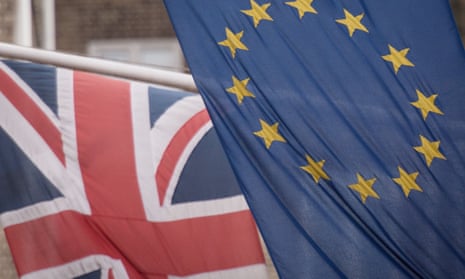The EU’s spending promises and pension costs rose by tens of billions of euros last year, an official report reveals, raising the possibility of an escalating Brexit divorce bill for the UK.
The EU’s auditor also described member countries’ annual budget fees as “moveable”, because they are linked to commitments and liabilities that change.
The British government has said the Brexit bill will be £39bn, with payments spread over decades, ending in 2064. But the EU’s chief negotiator, Michel Barnier, has never endorsed this figure, nor revealed an alternative. A senior EU source told the Guardian in 2017 that the UK had signed up to €60bn (£53bn), after the two sides settled the issue last December.
Both sides can make different claims, because the figures are based on complex calculations woven with uncertainties, from the likelihood of countries defaulting on EU loans, to the life expectancy of a Brussels fonctionnaire.
The UK public spending watchdog, the National Audit Office, has described the Treasury estimate of up to £39bn as “reasonable”, although it said the “range of uncertainties were not fully reflected”, because of the unpredictability of future events.
Figures released by the EU’s auditors shed new light on the EU’s growing debts and liabilities that will be shared with the UK after Brexit. Spending promises hit a record €267bn in 2017, up from €239bn the previous year, and almost twice the size of the EU’s annual budget.
In official jargon, these spending promises are known as reste à liquider, the French accounting term to describe money that has been committed to a project, but not yet spent. The figure has soared in the last decade, as the EU has splashed out on big infrastructure projects, such as motorways and bridges, in central and eastern Europe.
The backlog, which the auditors are urging the EU to bring under control, is increasing faster than economists predicted.
The report also showed that EU staff pension liabilities rose to €73bn up from €67bn in 2016. EU budget guarantees – loans to EU member states for economic development, as well as loans for foreign countries – increased to €123bn, up from €115bn.
The EU’s total liabilities stood at €237bn in 2017, leaving the UK with a theoretical share of €30bn, although this excludes any share of assets.
The UK has promised to pay a share of bills and any unpaid loans as part of the divorce settlement.
The European court of auditors declined to comment on the Brexit bill, stressing the amount was subject to negotiations. However officials made clear there was a link between the obligations and the final Brexit settlement.
“Of course, there is a connection between the obligations, that is logical and that is what has to be calculated,” said the president of the European court of auditors, Klaus-Heiner Lehne. “It is an obligation from the past, it is an obligation that has been created when you are still a member of the club.”
The British government has agreed to pay its dues to the EU budget in 2019 and 2020, in line with the spending settlement negotiated in 2013 by David Cameron during his premiership. Lehne described those payments as “moveable”.
“The European Union, when they collect the membership fees, they do not put it into a bank account and wait for the interest,” he told journalists. “They only ask the member states to pay as much as they need. This is more or less an obligation, but it has a moveable size, depending on what is needed.”
The court declined to endorse the British government’s £39bn Brexit bill estimate, stressing its job was to check the numbers of the previous financial year. “We will be the ones at the end probably to have to check that [Brexit sum],” said Lehne.
A UK Treasury spokesperson said: “These accounts are based on historical information, and do not determine the size of any financial settlement. We will honour commitments made while being part of the EU, and we have negotiated a settlement that is fair to UK taxpayers. This is unchanged.
“The UK cannot be made to pay for additional spending beyond what it has signed up to as a member.”
